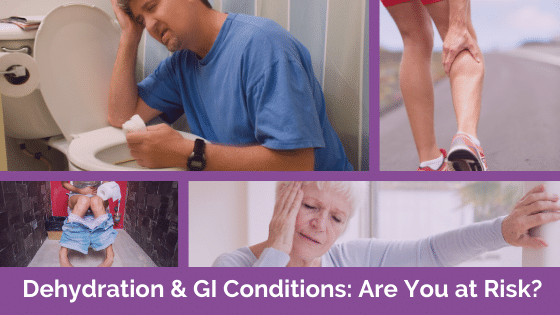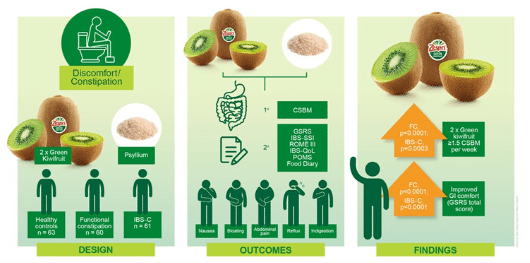Dehydration & GI Conditions: Are You At Risk?
Feeling thirsty? If you aren’t now, you may be by the end of this article.
Read on to learn all about dehydration and why it’s important to watch out for the signs of dehydration if you have a digestive condition.
What is dehydration?
Your body needs a certain amount of fluid in order to function properly. You normally lose fluid throughout the day and must take in liquids in order to meet your needs. If you don’t replace the fluid you lose, you will become dehydrated.
While forgetting to drink water while gardening outside on a hot day may lead to mild dehydration, severe dehydration can be life threatening if not treated.
Those with certain gastrointestinal (GI) conditions need to be particularly concerned about dehydration.
What GI conditions can cause dehydration?
If your digestive condition leads to diarrhea or vomiting (or both), then you are at risk for dehydration.
GI conditions that cause diarrhea include inflammatory bowel disease (IBD) and irritable bowel syndrome with diarrhea (IBS-D).
Conditions that cause vomiting can also lead to dehydration. IBD, especially Crohn’s disease, can cause vomiting and a motility condition called gastroparesis can result in nausea and vomiting.
If you experience diarrhea and/or vomiting and are not able to replace the lost fluids, you can become dehydrated.
How do I know if I’m dehydrated?
If you have mild or moderate dehydration, some of the signs may be:
- Feeling of thirst
- Headaches
- Muscle cramps
- Dry mouth
- Darker colored urine
- Less frequent urination
If you have severe dehydration, you may experience the above signs plus:
- Irritability
- Confusion
- Dry skin
- Rapid heartbeat
- Dizziness
- Loss of consciousness
- Very dark colored urine
- Rapid breathing
If you are experiencing symptoms of severe dehydration, CALL 9-1-1 immediately.
What to do if you’re dehydrated
Dehydration can be very dangerous, so it’s important to contact your doctor right away if you think you may be dehydrated.
Your doctor may check your blood pressure, heart rate, and do a physical exam to look for visible signs of dehydration. They may also order blood or urine tests.
Your doctor will determine if you need to be admitted to the hospital for your dehydration or if you can manage it at home.
Some of the ways to manage dehydration at home include sipping fluids and drinking electrolyte drinks. A registered dietitian can help determine your fluid needs and make recommendations to treat and prevent dehydration.
How to prevent dehydration
It’s important to get ahead of dehydration. If you are experiencing diarrhea or vomiting (or both), you should start drinking fluids as soon as you’re able. It’s also a good idea to get enough fluids on a daily basis so you’ll be prepared for unexpected fluid losses.
If your digestive condition is the cause of your dehydration, then working with your doctor and healthcare team to manage your GI symptoms is going to be essential for preventing future episodes.
While mild to moderate dehydration can usually be managed at home, it’s important to follow your doctor’s recommendations to prevent the dehydration from getting worse. Understanding how to manage and prevent dehydration is an important part of dealing with your condition. Now go grab yourself a drink and stay hydrated!
Related Resources:
ACG Patient Health Center: Diarrheal Diseases – Acute and Chronic
Katelyn Collins, RD is a registered dietitian and health writer specializing in digestive health. Katelyn’s personal experience with a digestive condition first sparked her passion for nutrition and health. Since then, she has been a vocal advocate for the digestive health community and has dedicated her own nutrition practice to serving those with digestive conditions.
Author:
Listen to our
latest Podcast!








